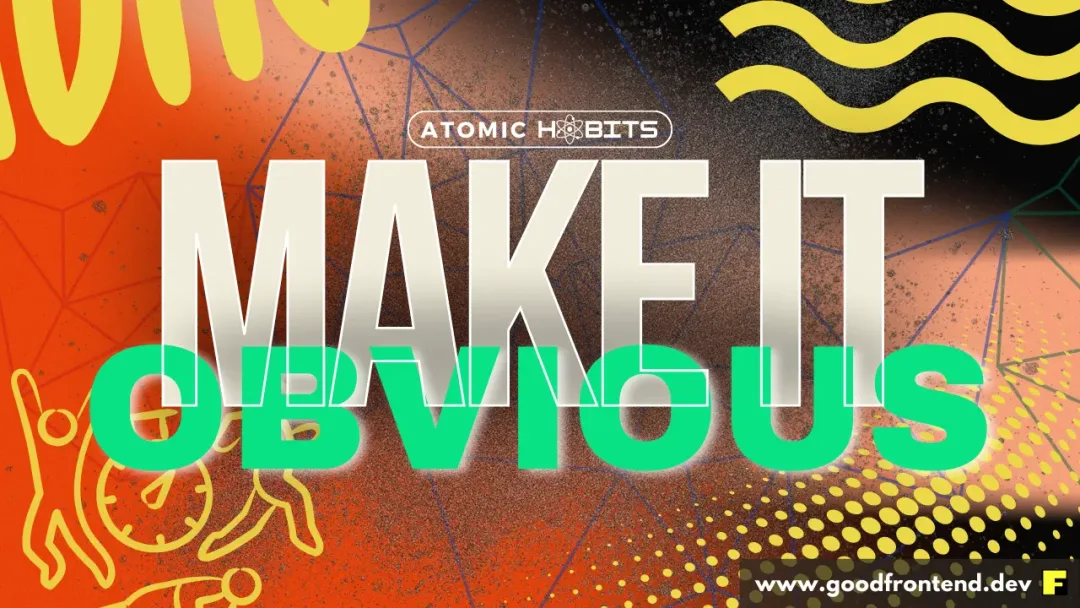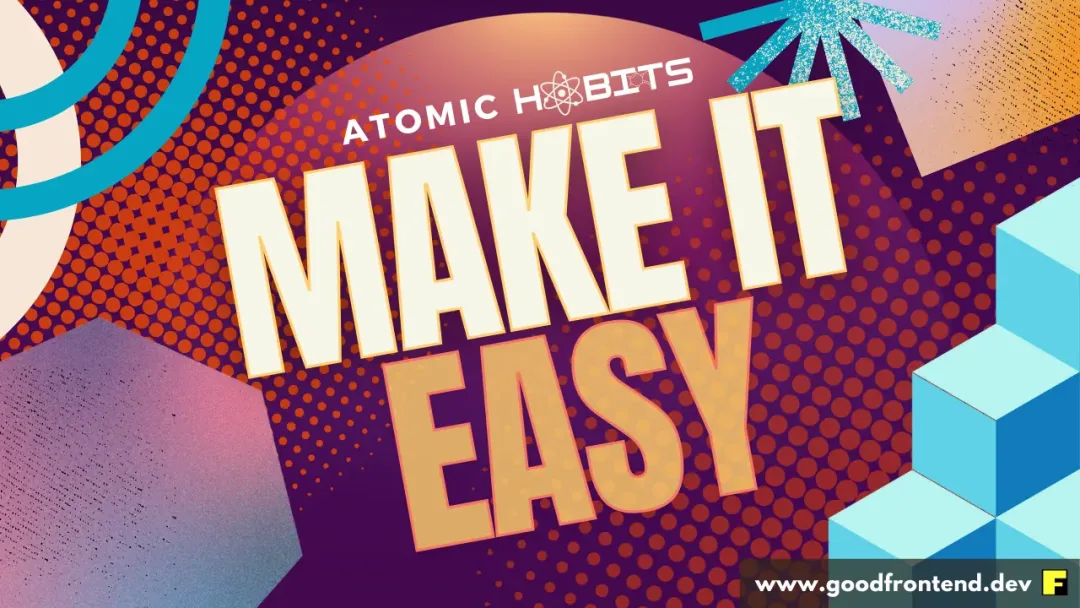By reprogramming your brain to crave beneficial actions, you can make good habits more attractive and naturally reduce the appeal of bad ones. So basically, it's about attaching positive feelings to good habits and attaching negative feelings to bad habits. That statement is quite abstract, but how would you apply that in like in a real world scenario as a software engineer? I guess one thing that I notice in the industry or the professional field is sometimes the unemployed people tend to rant and ask why they are not having jobs, while the ones that have actual jobs are always complaining about their jobs.
So maybe I think it is more of a perspective thing on how you attach the bad habits to its positive or its negative side. Just replacing one word in your sentence so I don't remember exactly the phrase but it goes something like I have to do this work or I have to do this. Just replace have with get like instead of I have to do this, I get to do this.
So that simple word just like it's a different feeling it transforms that chore into something that you want to do. So I guess the good thing about it as well is it practices gratitude. So like instead of saying oh I have to work, replace it with I get to work.
It's like oh I get to do this thing. I'm thankful for this opportunity to do this thing because not a lot of people can do this. Yeah, no absolutely.
Hi, I'm Kara Yves Cadelina, HR Director of Good Frontend OPC. We're here at Camp John Hay, Baguio City for a week of personal development. Together with the web developers, we feature our Good Frontend podcast.
Inspired by James Clear's Atomic Habits, we'll dive into practical strategies for building effective habits, breaking bad ones, and transforming your life one tiny step at a time. Let's get started on this journey of growth and transformation. Welcome back to the Good Frontend podcast.
My name is Kane, and I'll be your host. With me today is Erickson, JP, and Adrian. Today we will continue with the Atomic Habits podcast series, and we will be tackling the second law, which is to make it attractive.
So I guess the idea is if you're trying to build a habit, then you have to make it attractive. And if you're trying to break a bad habit, then you, well, you do the opposite, which is you make it ugly, right? The items that we will tackle, there's a few, I thought, concepts that are helpful from the book. One is the dopamine effect, the other one is temptation bundling, and then finally the role of social influence.
So maybe we can start with the question of making it attractive. So previous episode, we were talking about the cue, and we were mentioning that we should make it obvious. In this episode, we're talking about the craving, which is the second item in the habit loop.
So the first one is cue, then craving, then response and reward. So here we're talking about the craving and making it attractive. Maybe you're the resident expert, JP, since you did a presentation in this.
Maybe you can just give us a quick summary. What does it mean to make your craving, make it attractive? Okay. So I guess the book stated about this section of the second law by making it attractive is they used examples of how society nowadays is made to attract people, like if there's advertisements, whether it's food or basically anything you see in the media.
So usually we diverted to having super, what do you call this? Amplified sweets, amplified attention with social media, and I guess amplified advertisements and all that. So the whole concept is basically spiking dopamine so that we want more and more and when we get a dopamine rush, we tend to do that thing more. So yeah, I think that's basically the whole concept.
Yeah. I guess it's like the pleasure chemical, right? It's a pleasure chemical, that's the dopamine effect, so to speak. Yeah.
What would you say is a bad use of dopamine? I think one example of having a bad use of dopamine is something like having vice. I think it's very common that everyone has something that they use as an outlet of stress. Some people tend to abuse some vice, so sometimes they won't be able to control themselves and since others become addicted to these vices, only these vices help them to regulate their dopamine or something that pressures them inside.
And since most of our vice is very harmful to our body or at least since most of the vice is harmful to ourselves and being able to couple it with dopamine, it makes it very addictive. And in turn, we sometimes abuse this so that it causes us harmful effects. Yeah.
I think for me, the one that really gets to me is the doom scrolling on social media because they've got it down to a T that they know that if you like a certain content, they just keep giving it to you. So, you're scrolling and then all of a sudden, you don't realize and then you're on it for one hour already. Yeah, I'm curious about that.
I guess if you're aware of the effects of dopamine, then you're more able to control or you can do something about it, so to speak. That whole dopamine effect tends to have a very negative connotation nowadays because of social media, because of vices, but how would you say you can turn that thing into something positive and to create a good habit? Yeah, I can answer that. So, let's say for example, after an hour of work, we can probably use what we call a Pomodoro technique, which is 50 minutes of work and probably 10 minutes of maybe scrolling to social media, which I think it's inserting the make it satisfying, which is the low for the 10 minutes for that is the satisfaction and the 10 minutes is like a deep work for that and in that way, we can create a habit for it.
Yeah, no, I like that. That's an interesting way. So, basically, you're saying with things like doom scrolling, it's not necessarily a bad thing if you limit it and then the other concept, I guess, is temptation bundling.
So, you're kind of bundling the whole doom scrolling, limiting it to, let's say, five minutes and then you go on to do the things that you need to do and then you do again. So, you're not necessarily stopping the dopamine effect or the temptation of that bad thing, but you're just limiting it to a controllable number. Is that right? Yes, that's right.
Sounds good. Sounds good. So, since we touched on this idea of temptation bundling, maybe someone can expand further.
How would you put temptation bundling in your own words? Temptation bundling is something that we've been doing since we were little. So, basically, it's just if you have a want, then you put it after something that you need to do. So, let's say your current habit is you exercise daily and then let's say you need to do a certain task at work, but you also want to just relax and watch Netflix or something.
So, temptation bundling is just putting what you need to do first. So, in my example, after I work out, I do the work. And after I finish the work, I do what I want.
So, in my case, I'm watching Netflix. So, it's really ingrained to us ever since we were little. Like, usually, our parents or baby teachers tell us to do our homework first before we do play or playing around.
So, it's kind of like saying work hard, play hard. Yeah, yeah. No, I completely get it.
I'm curious what the others think also. I guess for myself, it's when I think of work, well, whether it's a good thing or a bad thing, but the craving and the reward itself is the work itself. So, maybe that's what you call being a workaholic, where you're not working, you're craving work.
And then when you do work, that's the only time you feel the satisfaction. So, yeah, it's a good thing and a bad thing at the same time because you're doing a good thing, but because you're making it the ultimate thing or you're doing it too much, then it becomes a bad thing. But being aware, I guess, is really helpful.
So, when it comes to the book on Chapter 9, one of the things that it talks about is the role of family and friends in shaping your habits. So, I'll just read a quick summary on how it is. It says that the chapter emphasizes the influence of social norms and peer groups on behavior.
And he says that our habits, James Clear, says that our habits are influenced heavily by those that are around us, mainly those who are close to us, family and friends, those who are, let's say, many or the culture, and those who are powerful, the people we admire. And in terms of, I guess, when you're thinking of creating a new habit or at work, especially in software engineering, let's say, do you ever think about the role of family and friends in relation to work? I think, of course, you don't really choose your family. Maybe friends you choose sometimes.
But sometimes the things that we were taught as kids from when we were little until we grow up, I think those little habits of just doing your chores or something like that, I think you can apply those to your work as well. And sometimes it's not always good. Maybe your friends sometimes can give you bad habits due to peer pressure.
So, I think you really have to be aware of those good and bad habits because if you don't really choose or know the people around you, then you're basically just composed of a mix of good and bad habits. Yeah, that's a very good point, isn't it? I guess, yeah, family you can't choose, but others you can choose. How about the others? What do you think? Do you ever think about the people that surround you in relation to work? Do you ever think, oh, I'm going to choose to surround myself with this type of people or this person for career development? Or do you ever think of, oh, I want to stay away from this type of folks? Or is that something not in your radar entirely? I'd say, yeah.
We have a saying that, tell me who your friends are and I'll tell you who you are. So, basically, since humans basically are social creatures and we would like to engage with others. So, yeah, developing habits, especially working around people with similar habits makes it more fun, makes it more entertaining since you have to share your experience with other people.
So, especially if you want to develop a certain habit, whether it's a good one or a bad one, I think it is very important to surround yourself with other people that have the same goal as you since you can share your own experience, your hardships, your ideas on how to better or to share your ideas on how to better achieve your goals together. And at the same time, it is always fun to celebrate your achievements with other people. Yeah, sounds good.
I think definitely for GFED, our hiring is very intentional, especially because of our awareness of this fact that your social group effectively, there is an impact in terms of how you do your work. So, when we create our company culture per se, of course, we value diversity in terms of different types of thinking, different types of people, different types of background. But at the end of the day, there's always that commonality that they have to be aligning to the company values that we hold on to.
The bit that I thought was interesting is the powerful. So, James Clear says that we are deeply influenced by the powerful, the people we admire or want to imitate. And in your case, are you guys like a follower of any particular software engineer or celebrity kind of person who does tutorials? Or who would you say is your most influential, powerful influencer? Well, I'm not too much of a fan of any of those, I guess, known software engineers.
But I do know them and I do follow what's going on with their, what they're famous for. So, I tend to pick up some points. I don't usually follow them all.
So, I usually just cherry pick those traits that help them succeed. So, every single developer is different. Of course, I mean, you have similarities and differences.
But yeah, I guess if let's say you want to be a specific person, then yeah, just follow that person's tendencies and what it took him to succeed. But yeah, I think in my case, I don't really have a specific person that I worship or idolize. So, I just cherry pick the good traits that I can pick up so that it can help me get better.
Yeah. What about the others? I think it's a bit of a shame that when you look at some social media, I guess influencer marketing is a huge thing, right? Personalities and it's often, unfortunately, you don't necessarily get like, I don't know, maybe a project manager influencer because it's boring. You get people who are more, I don't know, doing random things.
That's not helpful to society. But anyways, yeah. What about the others? Do you follow any, let's say, website or people specifically that is helpful in terms of your career building or software engineering practices? I think I can go.
So, for me, I follow some people, which is a podcast called Syntax. I follow them because it lets me get up to date, which what happens around the world. And there's a lot of things that you can learn out there that gives you another perspective.
And on the business sides as well, technicals and communications. And it lets you overcome those things. And it improves your overall well-being and on your technical sides.
Nice. What other podcasts do you follow apart from Syntax as FM? I think Happy Frontend Hour, which is... Happy Frontend Hour. Okay, nice.
Which is directly on the frontend. It's like a casual conversation with the frontend guys about the things that will change in the future. Something like that.
Nice, nice. How about you guys? Do you follow any podcaster or anything? Not really a fan of those, honestly. Yeah, I think I used to follow... I can't remember now, to be honest.
I think I used to do more when maybe I drive, but nowadays, because of working from home, I hardly listen to some of these podcasts. Okay, great. So, this whole episode, I guess, is around the idea of craving, right? Craving.
Let's talk about bad habits. In episode one, we were talking about how software engineers tend to have bad habits and, let's say, variable naming or state management or lack of documentation. And then we were discussing that the solutions to would be collaborative things such as retrospectives, code reviews, and having technical architecture meetings.
I'm curious, does anyone else have any other ideas in terms of bad habits? Let me maybe put that more into context. So, here's a summary of chapter 10, which is how to find and fix the causes of your bad habits. So, James Clear says this, that identifying the root cause of bad habits by understanding the cravings that drive them.
So, James introduces the concept of reprogramming your brain to associate positive outcomes with good habits and negative outcomes with bad habits. The key to breaking bad habits is not fighting the cravings, but finding ways to redirect or replace them. Firstly, do you agree with that statement? Yeah, sounds good.
So, he says, by reprogramming your brain to crave beneficial actions, you can make good habits more attractive and naturally reduce the appeal of bad ones. So, basically, it's about attaching positive feelings to good habits and attaching negative feelings to bad habits. That statement is quite abstract, but how would you apply that in a real-world scenario as a software engineer? What would you say is how can you use this reprogramming of cravings to your advantage? I guess one thing that I noticed in the industry or the professional field is sometimes the unemployed people tend to rant and ask why they are not having jobs, while the ones that has the actual jobs are always complaining about their jobs.
So, maybe I think it is more of a perspective thing on how you attach the bad habits to its positive or its negative side. So, maybe if you could associate the bad habits into its bad side, maybe you will tend to be avoiding that bad habits. And if you instead attach the good habits to its good side, maybe you would want to do it.
So, in our case, I think I should associate working as a positive thing. So, for me, I think it is better to associate working as a good thing so that in turn, it will give us a satisfying reward and we can see its positive side. Yeah, I know it sounds good.
So, basically, what you're trying to say is it's all about perspective. It's how you view the situation you're in. You can always view it negatively or you can view it positively.
So, if you're unemployed, you can say, I don't have work, but it could be that you say, because I'm unemployed, I have a lot of time to learn new skills. And equally, if you're working, rather than, I don't know, maybe ranting or complaining about work, rather looking at the positive side and the benefits that work provides to you. Now, it sounds good.
How about you guys? Anything you want to add? I think I'd like to add on what Adrian just said about perspective. Because I remember there was one point in the book that was mentioned about the perspective of an individual in terms of how to get things done. So, there was this example, just replacing one word in your sentence.
So, I don't remember exactly the phrase, but it goes something like, I have to do this work, or I have to do this. Just replace have with get. Instead of, I have to do this, I get to do this.
So, that simple word, it's a different feeling. It transforms that chore into something that you want to do. So, I guess the good thing about it as well is it practices gratitude.
So, instead of saying, oh, I have to work, replace it with, I get to work. It's like, oh, I get to do this thing. I'm thankful for this opportunity to do this thing because not a lot of people can do this.
No, absolutely. That's really powerful. I like that.
Just changing that one word in your vocabulary reframes the idea of changing a chore into something that is a privilege to do. Thank you so much for that. I think we can end with that statement.
I like that. Rather than saying, I have to do this, I get to do this. Amazing.
Thank you. Thank you, Adrian, JP, and Ericson.













